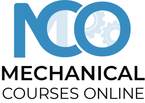
Centrifugal Compressor "Recorded" Arabic
Why Choose This Training Course?
What purpose does a centrifugal compressor serve? A centrifugal compressor is a sub-class of turbomachinery that achieves a rise in pressure by adding kinetic energy to a continuous flow of fluids through the roller or impeller.
Operation of centrifugal compressors considerably depend on speed, horsepower and driver type. They form an important part of essential turbomachinery and hence should be maintained and repaired if needed.
This MCO training course will empower you with complete information and understanding of centrifugal compressors. Through this course, you will acquire the required knowledge, experience and skill to work with centrifugal compressors and would be able to contribute to your organization by ensuring their optimal operation and conducting regular maintenance and repair to prevent huge losses for the organization.
This, in turn, will demonstrate your skill and ability to oversee the operation of all processes, providing opportunities for senior roles and responsibilities not just in your organization but others too.
What are the course Goals?
The primary objective of this Centrifugal Compressor Design, Operation and Maintenance training course is to empower professionals with
- comprehensive understanding of centrifugal compressors, including aspects related to their design, operation and maintenance
- the required awareness and understanding to choose the appropriate centrifugal compressor for your equipment
- adequate understanding and experience to deal with practical challenges encountered while working with centrifugal compressors
- awareness of international standards and guidelines for maintenance and operation of centrifugal compressors
- enhanced strategic and analytical skills to assess possible risks and make provisions to mitigate these to prevent losses
- adequate understanding and experience to conduct regular audits of compressors, thereby ensuring equipment longevity
- confidence and knowledge to train other professionals on working with centrifugal compressors
- the overall skill and capabilities to work in any industry, thereby increasing opportunities for progression
How will this Training Course Be Presented?
Courses at MCO are created with scope for customization as per the intended audience. Lectures are delivered by experienced professionals with experience min 15 years at its field to ensure deliver real and practical knowledge supported by standards and also using detailed audio-visual presentations. Two-way participation is encouraged through group activities and projects, including role-plays and case study discussions. Experiential learning is considered an important part of training.
The above format of training conceptualized by MCO is used for all its courses and is called PDCA the plan–Do–check–Apply (act).
Organizational Impact
By professionals taking this Centrifugal Compressor Design, Operation and Maintenance course, organizations will derive the following benefits:
- Trained and experienced professionals to manage operations and maintenance of centrifugal compressors
- Regular inspections for checking repair requirements to ensure equipment longevity, thereby reducing costs and contributing to organizational development
- Regular training of other employees to effectively work with centrifugal compressors
- Adherence to international standards and benchmarks of operation, quality and employee safety, thereby increasing organizational credibility
- Increased investments because of greater credibility and safer, more efficient operations
- Mitigation of risks by regular maintenance and repair activities
Personal Impact
Professionals enrolling for this Centrifugal Compressor Design, Operation and Maintenance training course will derive the following benefits:
- Comprehensive information and understanding of centrifugal compressors in details all parts, material used and not used, clearances, seals with all types (labyrinth seal, dry gas seal, barrier seal), bearings types used at centrifugal compressor and its clearances and when you should change it? balance drum its function, impellers types, configuration, diaphragm, and all about aero assembly
- Increased confidence to train other professionals on working with centrifugal compressors
- Enhanced perspective and analytical skills to review operations, predict risks and take steps to mitigate these to prevent occupational hazards, contributing to employee safety
- Greater knowledge and experience to conduct regular audits to check for scope of maintenance or repair activities
- Increased knowledge and experience to choose the correct material and type centrifugal compressors, as per the intended operation
- Increased knowledge of international standards and guidelines for operation and maintenance of centrifugal compressors
- Enhanced skill set and capabilities to undertake higher roles and responsibilities related to overseeing operations of centrifugal compressor-related equipment in any industry, thereby increasing opportunities for career progression
Who is this Training Course for?
- Plant engineers involved in running and handling equipment with centrifugal compressors
- Engineer -Fresh graduated who intend to work at industry (oil and gas, manufacturing,…..etc.)
- supervisors as well as operators overseeing operations involving centrifugal compressors
- Quality auditors and compliance officials responsible for ensuring adherence to required standards and benchmarks
- Suppliers involved in material and equipment purchase and sale
- Any other professional who would like to know more about centrifugal compressors
Course Content
- Classification of Compressors based on Design and Application
- World Standards and Codes related to Compressor Design
- Main Elements of Centrifugal Compressor Construction
- Overview of the Main Features
- Centrifugal Compressor Aerodynamics - Thermodynamics
- Changes in Gas Velocity and Pressure in a Centrifugal Compressor
- Mass and Volume Flow Rate as a Function of Pressure, Temperature and Gas Composition
- Discharge Temperature, Power Absorbed as a Function of the Gas Composition and the Operating Conditions
- Surging, choking, bleed valves, variable stator vanes, inlet guide vanes
- Guidelines for Trouble-free Centrifugal Compressor Operation
- Identification and monitoring: Failure mechanisms
- Strategize the right maintenance plan
- Preventive maintenance tasks and scheduling.
- Lubrication system
- Sealing system
- Bearings types and its operation
- Alignment of Thermal Machines
- Balancing of Rotating Machines
- Troubleshooting through Vibration Analysis, Oil Analysis and Thermography
